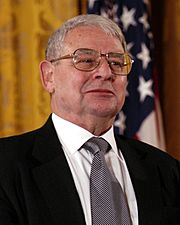Riccardo Giacconi facts for kids
Quick facts for kids
Riccardo Giacconi
|
|
|---|---|

National Medal of Science award ceremony, 2003
|
|
| Born | October 6, 1931 |
| Died | December 9, 2018 (aged 87) San Diego, California, U.S.
|
| Nationality | Italy United States |
| Alma mater | University of Milan |
| Known for | Astrophysics |
| Awards | Elliott Cresson Medal (1980) Dannie Heineman Prize for Astrophysics (1981) Nobel Prize in Physics (2002) |
| Scientific career | |
| Fields | Physics |
| Institutions | Johns Hopkins University Chandra X-ray Observatory |
| Doctoral advisor | |
| Doctoral students | |
Riccardo Giacconi (October 6, 1931 – December 9, 2018) was an Italian-American astrophysicist. An astrophysicist is a scientist who studies space, stars, and galaxies. He is famous for helping to start a new way of looking at the universe: X-ray astronomy.
In 2002, he won the Nobel Prize in Physics. He received this award for his important work in X-ray astronomy. He was also a professor at Johns Hopkins University.
Contents
Who Was Riccardo Giacconi?
Riccardo Giacconi was a brilliant scientist. He was born in Genoa, Italy, in 1931. Later, he moved to the United States. He became a citizen of both Italy and the U.S.
He spent his life studying the universe. He wanted to see parts of space that were hidden from regular telescopes. His work changed how we understand stars and galaxies.
Exploring the Universe with X-rays
X-rays are a type of light we cannot see. Doctors use X-rays to see bones inside your body. Riccardo Giacconi realized that X-rays could also show us amazing things in space.
Many objects in space, like black holes and supernovas, give off X-rays. But Earth's atmosphere blocks these X-rays. This means we cannot see them from the ground.
Giacconi helped create special telescopes that could go into space. These telescopes could capture X-rays from distant stars and galaxies. This new way of seeing space was called X-ray astronomy.
Early Discoveries
One of his first big successes was finding the first X-ray source outside our solar system. This source was called Scorpius X-1. It was a huge discovery! It proved that X-ray astronomy was possible and important.
He also led the creation of the Chandra X-ray Observatory. This is a powerful space telescope. It has taken many amazing pictures of the X-ray universe.
His Important Work
Riccardo Giacconi's work opened a new window to the universe. Before him, scientists could only study space using visible light or radio waves. X-ray astronomy showed us hot, energetic events in space.
His discoveries helped us learn about:
- Black holes: These are areas in space where gravity is so strong that nothing, not even light, can escape.
- Neutron stars: These are very dense stars that are left after a supernova explosion.
- Galaxy clusters: These are huge groups of galaxies held together by gravity.
His efforts helped build the tools and methods for X-ray astronomy. This led to many new discoveries about our universe.
Later Life and Legacy
Riccardo Giacconi continued his scientific work for many years. He taught at Johns Hopkins University. He inspired many young scientists.
He passed away on December 9, 2018, in San Diego, California. He was 87 years old. His legacy lives on through the X-ray telescopes still orbiting Earth. His work continues to help us explore the mysteries of the cosmos.
See also
 In Spanish: Riccardo Giacconi para niños
In Spanish: Riccardo Giacconi para niños
 | Claudette Colvin |
 | Myrlie Evers-Williams |
 | Alberta Odell Jones |

